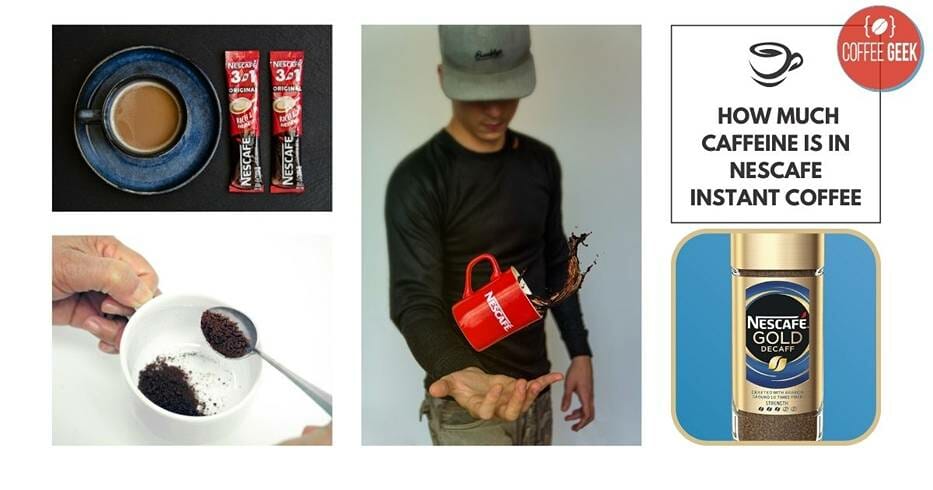When it comes to morning routines, there’s no denying the vital role that a steaming cup of instant coffee, especially Nescafe instant coffee, plays for many people. Wondering how much caffeine in Nescafe instant coffee?
Regular drinkers would say it’s nestled right at the intersection of convenience and deliciousness, Nescafe sits atop the throne as one of the most popular instant coffee brands on the planet.
But have you ever wondered, “How much caffeine is in Nescafe instant coffee?” Well, you’re not alone, so let’s dive into it together.
- What is the Caffeine Content in a Cup of Nescafe Instant Coffee?
- How Does the Caffeine Level in Nescafe Compare to Other Beverages?
- Decoding the Amount of Caffeine in Each Nescafe Product
- Can You Limit Your Caffeine Intake with Nescafe Decaf Coffee?
- What Role Does a Teaspoon Play in Determining Your Caffeine Intake from Nescafe?
- Questions and Answers
What is the Caffeine Content in a Cup of Nescafe Instant Coffee?
A single serving of Nescafe usually contains around 70 mg of caffeine per cup. The caffeine content may vary slightly depending on the blend and how much of the coffee granules or powder you use.
The caffeine in Nescafe instant coffee is obtained from finely ground coffee beans which are strained and freeze-dried to maintain their robust flavor and caffeine content.
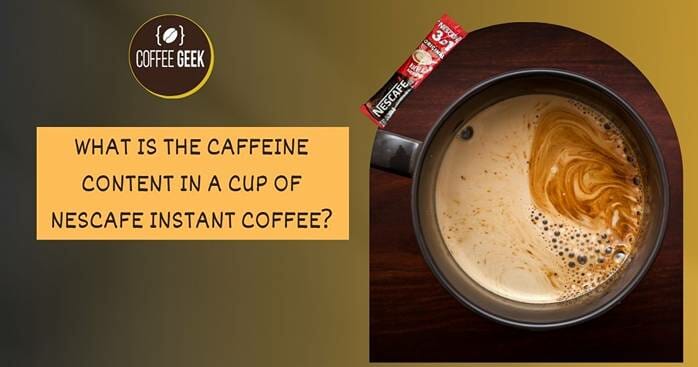
Comparing Caffeine Levels in Nescafe and Other Instant Coffee Brands
With their classic instant coffee, Nescafe’s caffeine content stands competitive compared to other brands.
Starbucks VIA Instant, another widely consumed instant coffee brand, contains around 90 mg of caffeine per cup, showing Nescafe’s extensive range is just in the middle of the spectrum.

How the Brew Method Affects Caffeine Content in Coffee
The caffeine level of your coffee cup also hinges heavily on the brew method employed.
Freshly brewed coffee from ground coffee could contain higher caffeine content, averaging between 90 to 95 mg per cup, as compared to instant coffee.
The disparity comes mostly from the preparation method and coffee concentration.
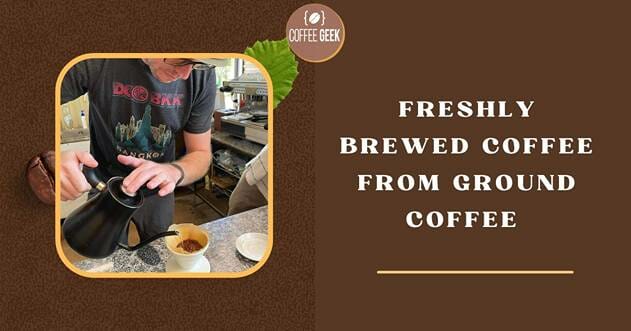
Average Caffeine in a Cup of Instant Vs Brewed Coffee
Typically, instant coffee generally contains less caffeine than brewed coffee. The reason is, instant coffee tends to use less coffee and more water, hence the fewer milligrams of caffeine per fluid ounce than in brewed coffee.
How Does the Caffeine Level in Nescafe Compare to Other Beverages?
Just like Nescafe instant coffee, the caffeine content in various drinks differs significantly. How much caffeine in Nescafe instant coffee? The amount of caffeine you consume can vary based on the types of beverages you drink, their size, and even their brand.
Caffeine in Nescafe Vs Espresso
An espresso shot generally packs much more caffeine per fluid ounce than Nescafe instant coffee.
An average espresso contains about 60-65mg of caffeine, but it’s worth noting that espresso servings are usually much smaller than a standard cup of Nescafe.
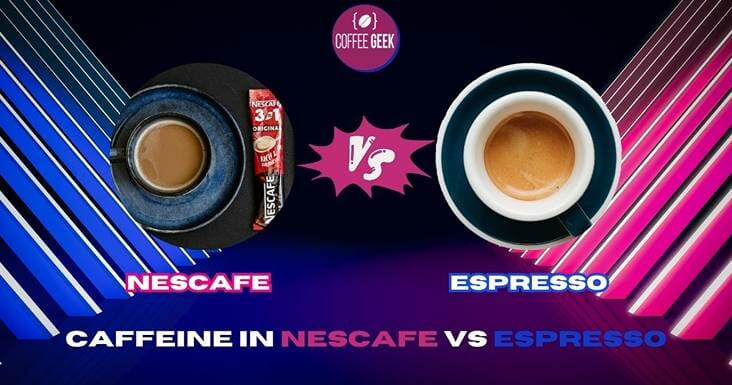
Comparing Caffeine Intake from Nescafe and Green Tea
Green tea, a healthier alternative to coffee for those watching their caffeine consumption, usually contains less than 30mg of caffeine per cup, making Nescafe a stronger choice for coffee drinkers looking for a bit more punch in their cup.
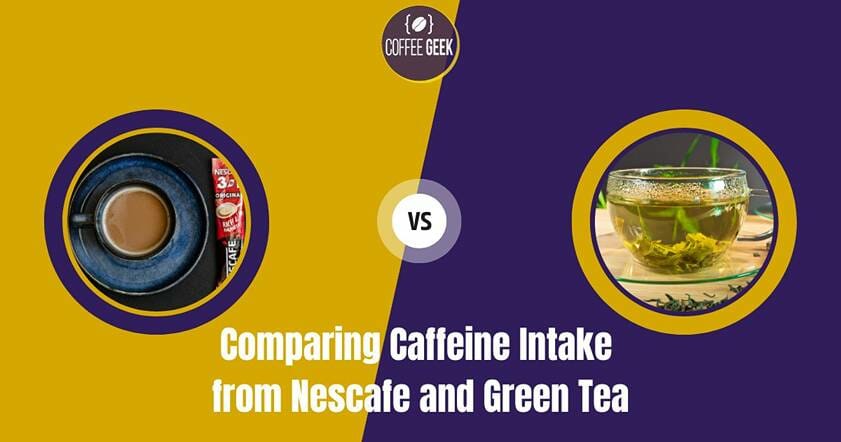
Coffee Beans and Their Caffeine Content Compared to Nescafe
In terms of caffeine content, a cup of coffee brewed from coffee beans typically contains more caffeine than Nescafe.
However, Nescafe can be a good choice for those wanting a consistent amount of caffeine in their cups.
Decoding the Amount of Caffeine in Each Nescafe Product
Now, as we go deeper, let’s take a look at the caffeine content in some specific Nescafe products.
Caffeine in Nescafe 3-in-1: A Comprehensive Analysis of how much Caffeine in Nescafe Instant Coffee
The Nescafe 3-in-1 instant coffee, favorited by many for its creamy and sweet composition, contains about 50 mg of caffeine per packet, making it a healthier choice for those mindful of their caffeine intake.

The Caffeine Count in Nescafe Classic 2g
A 2g serving of Nescafe Classic instant coffee contains approximately 50-60 mg of caffeine, giving you just enough of a boost to kick start your day or provide that midday pick-me-up we all need occasionally.
Looking at the Caffeine Levels in Nescafé Gold
Nescafe Gold, renowned for its smooth and rich taste, contains approximately 60-70 mg of caffeine in a 2g serving. This variant offers a more authentic, aromatic, and harmonious coffee experience to its drinkers.
Can You Limit Your Caffeine Intake with Nescafe Decaf Coffee?
For individuals who love the taste of coffee but are on the lookout to limit their caffeine intake, decaf coffee is a great choice.
Understanding How Much Less Caffeine is in Nescafe Decaf
Nescafe Decaf houses dramatically less caffeine as compared to regular Nescafe instant coffee variants, with only around 2-5mg of caffeine per 200ml cup.

Comparing Decaf and Regular Nescafe Instant Coffee: Caffeine Content
When comparing decaf coffee and regular Nescafe instant coffee in terms of caffeine, the vast difference is quite clear.
Decaf coffee contains significantly less caffeine, making it ideal for those who are trying to limit their caffeine consumption.
Decaf Coffee vs Regular Coffee: Health Implications and Caffeine Consumption
Health-wise, decaf coffee can be a great choice. Despite having fewer milligrams of caffeine, it doesn’t sacrifice the wonderful coffee flavor and aroma that coffee lovers crave.
This makes a cup of decaf a perfect beverage for those keeping track of their caffeine consumption while still enjoying their hot cup of coffee.
| Nescafe Instant Coffee Product | Caffeine Content (per serving) |
|---|---|
| Nescafe Classic (1 tsp, 2g) | Approx. 60-80 mg |
| Nescafe Gold Blend (1 tsp, 2g) | Approx. 60-80 mg |
| Nescafe Taster’s Choice (1 tsp, 2g) | Approx. 60-80 mg |
| Nescafe 3-in-1 Instant Coffee (one sachet) | Approx. 30-45 mg |
| Nescafe Espresso (1 capsule) | Approx. 50-65 mg |
| Nescafe Decaf (1 tsp, 2g) | Less than 5 mg (virtually caffeine-free) |
What Role Does a Teaspoon Play in Determining Your Caffeine Intake from Nescafe?
When preparing a cup of Nescafe instant coffee, the quantity of coffee you use plays a significant role in determining your caffeine intake. This is where the teaspoon comes into play.
How Much Caffeine in a Teaspoon of Nescafe?
Typically, a heaping teaspoon of Nescafe Classic instant coffee equates to around 2g and contains approximately 57 mg of caffeine. However, remember that the exact amount will depend on how heaping the teaspoon is.
These measurements can be a helpful gauge when trying to manage your daily caffeine intake.
Impact of Using a Teaspoon Vs a Tablespoon on Caffeine Intake from Coffee
The choice between using a teaspoon and a tablespoon can impact the caffeine dose in your coffee. Typically, a tablespoon of Nescafe instant coffee will result in a cup with a significantly higher caffeine content than using a teaspoon.
Optimizing Your Caffeine Intake: The Per Mug vs Per Teaspoon Controversy
One could ponder the difference between per mug and per teaspoon caffeine intake.
If you want to optimize your caffeine consumption to suit your needs, consider the amount of coffee you’re using (measured in teaspoons or tablespoons) and the size of your cup or mug.
Questions and Answers
How much caffeine is in Nescafe instant coffee?
On average, a 2g serving of Nescafe instant coffee contains about 63mg of caffeine. However, this can vary depending on the specific product and the method of preparation.
Are there different types of Nescafe with varying caffeine content?
Yes, there are different instant coffee brands and types of coffee offered by Nescafe.
For example, Nescafé Gold is a premium instant coffee with slightly higher caffeine content compared to Nescafe Classic.
How much caffeine is in Nescafe 3-in-1?
A serving of Nescafe 3-in-1 instant coffee, usually a 2-gram sachet, contains around 50 to 90 mg of caffeine. This range may change depending on the brewing time and concentration used.
How does the amount of caffeine in a cup of Nescafe instant coffee compare to a cup of brewed coffee?
Generally, a cup of instant coffee contains less caffeine than a cup of brewed coffee.
This is because brewed coffee is made by percolating hot water through coffee grounds, which results in a stronger cup with more caffeine content.
Where does the caffeine content in Nescafe’s instant coffee come from?
The caffeine content in Nescafe’s instant coffee comes mainly from the type of coffee beans used – arabica or robusta. Robusta coffee beans, for instance, contain more caffeine than arabica beans.
What happens if I take more than one teaspoon of Nescafe instant coffee granules?
Using more than the recommended one teaspoon of Nescafe instant coffee granules will lead to a strong cup of coffee with a higher caffeine content.
If you’re sensitive to caffeine, this may cause jitteriness or other side effects.
Does the roasting process impact the caffeine content in Nescafe instant coffee?
No, the roasting process does not significantly affect the caffeine content in Nescafe instant coffee. Both dark roast and light roast coffees have similar caffeine levels.
How much caffeine is there in a cup of Nescafe Classic?
A 2-gram serving of Nescafe Classic, which makes one cup of coffee, contains approximately 63 mg of caffeine.
Does drinking Nescafe instant coffee every day have any health impacts?
Moderation is key when it comes to consuming caffeine. Most health experts consider 400 mg of caffeine per day to be a safe amount for most healthy adults.
That’s roughly the amount of caffeine in four cups of brewed coffee, ten cans of cola, or two “energy shot” drinks.
Does Nescafe instant coffee contain less caffeine than espresso?
Yes, Nescafe instant coffee usually contains less caffeine than espresso.
A shot of espresso usually has around 63 mg of caffeine, while a serving of Nescafe instant coffee has about 50 to 90 mg of caffeine, depending on the specific product and preparation method.

